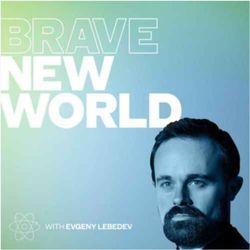Share

Tech and Science Daily | The Standard
The impact of Heathrow Substation Fire
Season 1
•
Heathrow Airport closed after a fire broke out at a single substation in West London - causing a massive power outage.
In today’s episode we hear about the critical role of electrical substations in our infrastructure from Head of Technical Regulations at the Institution of Engineering and Technology Mark Coles.
We also find out about the global impact of the closure of one of London’s busiest airports from Principal Research Fellow at University College London’s Air Transportation Systems Group, Dr Lynnette Dray.
More episodes
View all episodes

Tube fares change, UK tests teen social media limits, iron + blue LED chemistry breakthrough, and Pokémon turns 30
06:34||Season 1Your commute’s doing that thing again: Tube and rail fares are increasing, while buses and trams stay frozen (for now). Alan Leer also dives into the UK’s real-world trial of teen social media limits — bans, curfews, the lot — and what it could mean for platforms and parents alike. Then it’s global gadget season at MWC, where Lenovo and Samsung are pushing the “adaptable devices” future, whether your bank account likes it or not. Plus: a genuinely slick science story where iron and blue LEDs pull off precision chemistry that usually needs rare metals. And in gaming, Pokémon hits the big 3-0. More at standard.co.uk — and follow Tech and Science Daily from The Standard for your weekday briefing.
Brave New World Preview: Dr Sabine Donnai on Mapping the Microbiome and the Secrets to Longevity
14:32||Season 1For this episode of Brave New World, Evgeny is joined by Dr Sabine Donnai, a physician specialising in precision medicine, preventive health, and is the founder of Viavi Healthcare. They explore brain health beyond standard scans, discussing how gut function, inflammation, environmental exposure, and stress interact over time. Drawing on Evgeny’s own test results, Sabine explains why she believes long-term cognitive resilience starts not with extreme biohacks, but with fixing the basics - particularly the gut. The conversation concludes with practical takeaways: reduce inflammatory foods, increase dietary diversity and fermented foods, support cardiovascular health, and avoid turning longevity into another source of stress.
O2’s Starlink phone satellite service, London’s Knowledge Quarter AI drug push, faster UK cyber fixes, NASA’s “planetary parade” sounds, and Resident Evil Requiem launch
07:04||Season 1a new life-sciences flex lands in King’s Cross as Genomics opens up shop in the Knowledge Quarter and shows off agentic AI for drug discovery. The government claims it’s finally speeding up cyber fixes across public services — about time — and O2 starts selling a satellite bolt-on powered by Starlink for those “why do I pay for this contract?” dead zones. After that, NASA turns the Solar System into an audio experience you can actually listen to, and in gaming, it’s launch day for Resident Evil Requiem — so dodge spoilers like it’s Oxford Street at rush hour. More at standard.co.uk, and follow Tech and Science Daily from The Standard for your weekday briefing.
UCL’s laser-drone forest scans, UK digital jobs snapshot, ASML chip breakthrough, “super agers” brain clue, and Xbox leadership shake-up
05:57||Season 1UCL researchers are using lasers and drones to scan forests in 3D — turning climate arguments into hard numbers. Then we zoom out to the UK’s latest digital sector stats, before heading global as ASML pushes forward the EUV tech that underpins the chips in basically everything. After the break, there’s a fascinating “super agers” brain clue — and in gaming, Xbox hits the big reset button at the top. More on all of it at standard.co.uk, and follow Tech and Science Daily from The Standard for your weekday briefing.
London’s historic womb transplant birth, UK regulates Netflix-style streamers, Uber’s robotaxi play, and Firefox’s AI off switch
07:29||Season 1Al’s on today’s proper jaw-dropper: London doctors announce a UK first — a baby born after a womb transplant from a deceased donor. Then it’s back to the paperwork side of the future as the government drags Netflix, Prime Video and the rest into tougher Ofcom-style rules. After the break, Uber tries to become the backstage crew for robotaxis everywhere, scientists reveal a new way to see DNA’s 3D structure, Fallout 4 goes portable on Switch 2, and Firefox does something radical: it gives you an AI off switch. More on all of it at standard.co.uk — and follow Tech and Science Daily from The Standard for your weekday briefing.
UK cyber crackdown calls, cross-border digital ID, “Hall drift of light,” and Xbox Games Pass lineup
06:00||Season 1Al brings you today’s Tech and Science Daily from The Standard. We cover a push for a more interventionist UK cyber strategy, new findings on barriers to international digital identity, a quantum photonics milestone involving light drift, early-stage research into an intranasal vaccine approach, and the latest Xbox Game Pass arrivals and departures.
MHRA Pauses PATHWAYS Trial, UK Space Weather Mission Moves Toward Launch, NASA Rolls Artemis II Back Again
05:01||Season 1Today, the MHRA puts the brakes on the UK’s PATHWAYS puberty blocker trial work while safety concerns get addressed, the UK’s space-weather mission heads toward its launch site (because satellites don’t protect themselves), and NASA’s Artemis II rocket gets rolled back for more fixes — yes, really. After that: a quick cyber patch warning, a punchy Arc Raiders update, and Samsung’s Unpacked week landing like a new phone season jump-scare. More on standard.co.uk
TfL ad banned, UK’s 48-hour takedown rule, China’s open-source AI surge, Avowed update
06:13||Season 1TfL gets an advert banned by the ASA for reinforcing a harmful stereotype, while the UK moves to force platforms to remove abusive intimate images within 48 hours — or face serious penalties. After the break, we hit the global AI acceleration story, and a proper gaming palate-cleanser with a big Avowed update. More on all of it at standard.co.uk — and follow Tech and Science Daily from The Standard so you’re never the last to know.
TfL clamps down on pedicabs, Bristol’s sensor shoe, Microsoft’s 10,000-year glass storage, Call of Duty ad banned
04:37||Season 1London finally starts putting the brakes on pedicab chaos — licences, checks, and fare caps that might save tourists from heartbreak and the rest of us from the noise. Outside the M25, a Bristol engineer builds a sensor-packed insole designed to spot dodgy gait changes before they turn into nasty falls. Then it’s full sci-fi: Microsoft shows off laser-written glass storage that could keep data safe for 10,000 years. In gaming, the UK ad watchdog bans a Call of Duty: Black Ops 7 advert for crossing the line. For more, head to standard.co.uk — and follow for your weekday briefing.